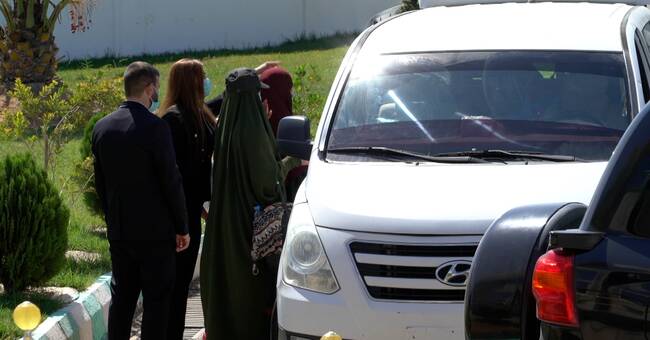A year ago, the Kurdish autonomy in northern Syria said that the women in the detention camps against whom evidence could be found would be brought to justice on the spot.
- We said that we were prepared to cooperate with other countries regarding this.
But so far we have no agreements with other countries, says Khaled Ali, judge in the Kurdish autonomy in northern Syria, to SVT's foreign reporter Stina Blomgren who is on site.
The three Swedish women with children, who have now been deported for life, are being sent back to Sweden because sufficient evidence has not been found to prosecute them.
Kurdish autonomy also lacks resources.
In June, the Kurdish self-government, which has long wanted Sweden to take home the Swedish IS prisoners, made the decision that the women should be deported and investigated by the Swedish judiciary.
"Pose a security threat"
Just before 5 pm on Monday evening, the three IS women and six of their children landed at Arlanda.
- These are women who pose a security threat.
These are Swedish citizens who have committed terrible crimes against my people, says Sweden's representative Shiyar Ali.
He also says that the deportation is about helping the children, who are also victims of this, but that it is also about ensuring a fair legal process.
- They are not ordinary svenssons who went on holiday and got lost.
It is radicalized people who have committed crimes.
I hope that Sweden will at least examine the possibilities of bringing them to justice.
Twenty Swedish children remain in prison camps
On Monday evening, the police confirmed that two of the women had been arrested by prosecutors and the third had been brought in for questioning.
If it is in the role of suspect, plaintiff or witness, the police do not want to answer.
According to information to SVT, one of the two women arrested is suspected of war crimes, genocide and crimes against humanity.
About ten Swedish women and upwards of about twenty children are still in IS prison camps.
Shiyar Ali can not yet answer what will happen to them.
- Our legal system must take care of those pieces and when it is ready we will see, says Ali.
In the clip above, you can hear more from the judge Khaled Ali in northern Syria and SVT's foreign reporter Stina Blomgren.

